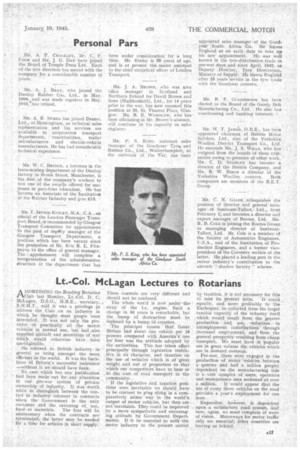Lt.-Col. McLagan Lectures to Rotarians
Page 19

If you've noticed an error in this article please click here to report it so we can fix it.
ADDRESSING the. Reading Rotarian .Club last Monday, Lt.-Col, D. C. McLagan, D.S.O., M.B.E., secretary, S.M.M.T., said .it was a privilege p address -the Club on an industry in which he thought most people were interested. It was not only the provider ofpractically all the motor vehicles in normal use,, but had .also supplied aircraft and munitions of war which would otherwise have been unolltainable.
Fla referred to Britishindustry in • general as being, amongst -the most efficient in the world. It was the backbone Of Britain's successful resistance —without it we'-shouldhave Sunk.
No case which has any justification had been made out for any alteration in our pre-war system of private ownership of inslustry. It was Worth while to distinguish between the control in industry' inherent in contracts when the Government is the only customer and the rationing of, say,
food -or materials. The first will be unnecessary when the contracts are terminated the latter may be needed for a time for articles in short .sUPPIY•
These controls are very different and should not be confused.
The whole world is now under 'the sway of the i.c. engine. Such a change in 50 years is remarkable, but the bump of destruction must be replaced 'by a latinip Of creation, 'The principal reason that. Great Britain had about one vehicle per 18 persons compared with America'i one for four was the attitude adopted by the authorities. This has taken effect principallythrough legislation restrictive in its character, and taxation on . the use of vehicles which is of great weight and out of proportion to that which our competitors have to bear or to the cost of road transport to the community.
If the legislative and taxation positions were inevitable we should. have to be content to plug along in a comparatively minor way in the world's output of motor vehicles, but they are not inevitable. They could be improved by a more sympathetic and encouraging attitude by Government Departments. If it be essential to milk the motor industry to the present extent
by taxation, it is not necessary for this
to take its present form. It could equally, and more profitably to the Exchequer, be collected from the larger taxable capacity of the industry itself which would result from the greater production and use, reduction in unemployment Contributionsthrough increased employment, and from the general prosperity resulting from cheap transport. We must have in -popular use in great volume the vehicles which are in demand overseas.
Pre-war, there were engaged in the production of motor -vehicles between a quarter and half a million people; dependent on the manufacturing side is a vast complex of users, operators and-maintenance men reckoned at over a million. It would appear that the use of every three vehicles on the road provides a year's employment for one man.
Expansion, however, is dependent upon a satisfactory road system, and here, again, we must complain of want of vision. Motorways for motor traffic only are essential; other countries are leaving us behind.




















































